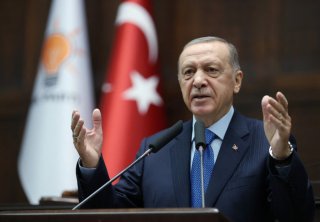Turkey Vows to Protect Ukrainian Grain Exports
Turkish president Recep Tayyip Erdogan announced on Monday that Turkey would continue to enforce the agreement, claiming that doing so was necessary for humanitarian aims.
The Turkish government announced on Monday that it would continue to ensure the free export of Ukrainian grain through the Black Sea, one day after Russia announced that it would suspend the United Nations (UN) and Turkish-brokered agreement protecting Ukrainian grain ships from attack while passing through Russian-occupied waters.
Russia suspended the deal on Saturday, indicating that a Ukrainian “terrorist attack” had damaged its naval fleet at its base in Sevastopol on the Russian-annexed Crimean Peninsula. Kremlin spokesman Dmitry Peskov announced in the aftermath of that attack that Russia could no longer monitor the Ukrainian vessels to ensure that they were not being used for military purposes, so it would no longer allow them to pass.
However, Turkish president Recep Tayyip Erdogan announced on Monday that Turkey would continue to enforce the agreement, claiming that doing so was necessary for humanitarian aims.
“Even if Russia behaves hesitantly because it didn’t receive the same benefits, we will continue decisively our efforts to serve humanity,” Erdogan said on Monday.
Also on Monday, Turkish and Russian defense ministers Hulusi Akar and Sergei Shoigu held a phone call in which the Turkish official claimed that it was essential for the grain shipments to continue. Akar reportedly claimed that the Ukrainian grain issue should be seen as entirely separate from the two countries’ war, according to a statement released by the Turkish defense ministry.
Amid international condemnation, the Russian government has doubled down on the suspension of the deal, and the Russian defense ministry released a statement on Monday arguing that the continued transit of Ukrainian ships along the pre-existing security corridor is “unacceptable” and alleging that the Sevastopol attack had been launched from a military ship masquerading as a civilian grain vessel.
“Since the Ukrainian leadership and command of the Armed Forces of Ukraine use [the corridor] to conduct military operations against the Russian Federation … there can be no question of guaranteeing the security of any object in the indicated direction until the Ukrainian side accepts additional obligations not to use this route for military purposes,” the statement read.
Neither Russia nor Turkey elaborated on what would happen if Ukrainian ships continued to use the route, or if Russian forces attacked a ship nominally under Turkish protection. A direct military clash between Russia and Turkey could trigger Article 5, the NATO treaty’s collective defense mechanism, and prompt a wider war between Russia and NATO.
Russian leader Vladimir Putin defended the suspension of the deal on Monday, asserting that most of the grain was being sold to areas not at risk of famine in contrast to its stated aims. However, due to the interconnected nature of international grain markets, prices rose immediately after the announcement of the suspension, complicating the ability of famine-prone nations to import needed supplies.
Prior to the deal’s expiration, roughly nine million tons of grain were transported by Ukrainian ships through the safe corridor.
Trevor Filseth is a current and foreign affairs writer for the National Interest.
Image: Reuters.

